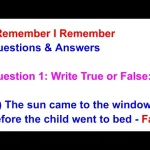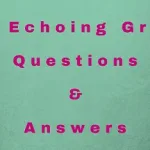The poem “I Remember, I Remember” by Thomas Hood is a reflection on the poet’s childhood memories. It contrasts the innocence and joy of youth with the reality of adulthood.
I Remember I Remember Question Answers:
Question: What is the central theme of the poem “I Remember, I Remember”?
Answer: The central theme of the poem is nostalgia and the contrast between the innocence of childhood and the realities of adulthood.
Question: Who is the poet of “I Remember, I Remember”?
Answer: The poet of “I Remember, I Remember” is Thomas Hood.
Question: What does the poet remember about his childhood?
Answer: The poet remembers the happiness, freedom, and simplicity of his childhood.
Question: How does the poet feel about his childhood memories?
Answer: The poet feels a sense of longing and sadness as he reflects on his childhood memories.
Question: What imagery is used in the poem to describe childhood?
Answer: The poem uses imagery of nature, such as trees, flowers, and the sun, to evoke the beauty and simplicity of childhood.
Question: What does the poet mean by “the sun came peeping in at morn”?
Answer: The phrase “the sun came peeping in at morn” refers to the bright and cheerful mornings of the poet’s childhood.
Question: How does the poet describe his feelings about the passage of time?
Answer: The poet expresses a sense of loss and melancholy as he realizes how quickly time has passed since his childhood.
Question: What literary devices are used in the poem?
Answer: The poem uses literary devices such as imagery, alliteration, and metaphor to convey its themes.
Question: How does the poet contrast his childhood with his present life?
Answer: The poet contrasts the joy and freedom of his childhood with the sadness and limitations of his adult life.
Question: What is the significance of the title “I Remember, I Remember”?
Answer: The title emphasizes the poet’s focus on his memories and the importance of remembering his past.
Question: How does the poet’s use of repetition affect the poem?
Answer: The repetition of the phrase “I remember” reinforces the theme of nostalgia and the act of recalling memories.
Question: What emotions does the poem evoke in the reader?
Answer: The poem evokes emotions of nostalgia, sadness, and longing in the reader.
Question: How does the poet’s tone change throughout the poem?
Answer: The poet’s tone changes from a sense of joy and wonder in recalling his childhood to a more somber and reflective tone as he considers the passage of time.
Question: What does the poet mean by “the trees were green”?
Answer: “The trees were green” symbolizes the freshness and vitality of the poet’s childhood.
Question: How does the poem reflect the poet’s view on growing up?
Answer: The poem reflects the poet’s view that growing up involves losing the innocence and joy of childhood.
Question: What role does nature play in the poem?
Answer: Nature plays a significant role in the poem as it is used to symbolize the beauty and simplicity of childhood.
Question: What is the poet’s attitude towards adulthood?
Answer: The poet’s attitude towards adulthood is one of regret and sorrow as he reflects on the loss of his youthful joy.
Question: How does the poem address the concept of memory?
Answer: The poem addresses memory as a powerful and poignant force that allows the poet to relive the happiness of his childhood.
Question: What does the poet mean by “my spirit flew in feathers then”?
Answer: The phrase “my spirit flew in feathers then” suggests the lightness and freedom the poet felt during his childhood.
Question: How does the poem explore the theme of loss?
Answer: The poem explores the theme of loss through the poet’s reflections on the passing of time and the fading of his childhood happiness.
Question: What does the poet remember about the house where he grew up?
Answer: The poet remembers the house where he grew up with fondness, recalling its warmth and the happiness he felt there.
Question: How does the poet describe the passage of time?
Answer: The poet describes the passage of time as something that has taken away the joy and simplicity of his youth.
Question: What is the significance of the line “my heart leapt up”?
Answer: The line “my heart leapt up” signifies the excitement and joy the poet felt as a child.
Question: How does the poet feel about the changes in his life?
Answer: The poet feels a sense of sadness and regret about the changes in his life as he has grown older.
Question: What memories of nature does the poet recall?
Answer: The poet recalls memories of nature, such as the green trees, the flowers, and the sunshine, which symbolize the beauty of his childhood.
Question: How does the poet use contrast in the poem?
Answer: The poet uses contrast to highlight the difference between his joyful childhood and his more somber adult life.
Question: What does the poet mean by “the sky above my head was blue”?
Answer: The phrase “the sky above my head was blue” symbolizes the clarity and peace of the poet’s childhood.
Question: How does the poem reflect the poet’s feelings about his past?
Answer: The poem reflects the poet’s feelings of longing and melancholy as he looks back on his past with fondness and sadness.
Question: What does the poet mean by “my head ran round and round”?
Answer: The phrase “my head ran round and round” suggests the excitement and energy the poet felt as a child.
Question: How does the poet describe his childhood home?
Answer: The poet describes his childhood home as a place of warmth, comfort, and happiness.
Question: What does the poet remember about the garden of his childhood home?
Answer: The poet remembers the garden as a beautiful and peaceful place where he spent many happy moments.
Question: How does the poet feel about his childhood memories?
Answer: The poet feels a deep sense of nostalgia and loss as he remembers the joy and freedom of his childhood.
Question: What does the poet mean by “I could not see the ground”?
Answer: The phrase “I could not see the ground” suggests the poet’s sense of wonder and excitement as a child, when everything seemed larger and more magical.
Question: How does the poet use imagery to evoke childhood memories?
Answer: The poet uses vivid imagery of nature and his surroundings to evoke the beauty and simplicity of his childhood memories.
Question: What does the poet mean by “the little window where the sun came peeping in”?
Answer: The “little window” symbolizes the small and intimate world of the poet’s childhood, filled with warmth and light.
Question: How does the poem convey the passage of time?
Answer: The poem conveys the passage of time by contrasting the poet’s joyful memories of childhood with his more reflective and somber present.
Question: What emotions are expressed in the poem?
Answer: The poem expresses emotions of nostalgia, longing, sadness, and a sense of loss as the poet reflects on his past.
Question: How does the poet’s use of language contribute to the overall mood of the poem?
Answer: The poet’s use of simple and evocative language creates a mood of nostalgia and melancholy, drawing the reader into his reflections on childhood.
Question: What does the poet remember about the flowers in his childhood garden?
Answer: The poet remembers the flowers in his childhood garden as symbols of beauty and innocence, which added to the joy of his early years.
Question: How does the poet contrast his childhood with his current life?
Answer: The poet contrasts the freedom and happiness of his childhood with the limitations and sadness of his adult life.
Question: What does the poet mean by “my heart still thrills with its old delight”?
Answer: The phrase “my heart still thrills with its old delight” suggests that the poet still feels a deep emotional connection to his childhood memories.
Question: How does the poet describe the sunlight in the poem?
Answer: The poet describes the sunlight as a warm and comforting presence, symbolizing the happiness and simplicity of his childhood.
Question: What role does memory play in the poem?
Answer: Memory plays a central role in the poem, as it allows the poet to relive the joy of his childhood while also highlighting the sadness of its passing.
Question: How does the poet’s tone change throughout the poem?
Answer: The poet’s tone shifts from a joyful recollection of childhood memories to a more reflective and melancholic tone as he considers the passage of time.
Question: What does the poet mean by “the sun came peeping in”?
Answer: “The sun came peeping in” refers to the bright and cheerful mornings of the poet’s childhood, symbolizing warmth and happiness.
Question: How does the poet use contrast to emphasize his feelings about childhood?
Answer: The poet uses contrast to emphasize the difference between the joy of his childhood and the reality of his adult life, highlighting his feelings of loss and longing.
Question: What does the poet mean by “my spirit flew in feathers”?
Answer: “My spirit flew in feathers” suggests the lightness, freedom, and carefree nature the poet felt during his childhood.
Question: How does the poem explore the theme of innocence?
Answer: The poem explores the theme of innocence by reflecting on the purity, joy, and simplicity of the poet’s childhood, which stands in stark contrast to his adult life.
Question: What is the overall message of the poem?
Answer: The overall message of the poem is that childhood is a time of innocence and joy, but as we grow older, we often lose that simplicity and happiness.
Latest Posts
- Step-by-step guide to download and apply for jee mains admit card 202
- Comprehensive 2025 government holidays and recruitment details for job seekers
- JEE Mains Admit Card 2025: Your Step-by-Step Guide to Downloading the Hall Ticket
- Everything You Need to Know About 2025 Government Holidays Recruitment
- Comprehensive Guide to rrb d group recruitment 2025 – Eligibility, Vacancies, and Application
- Detailed guide to nps trust recruitment 2025 vacancies, eligibility and apply process
- Comprehensive guide to hpcl recruitment 2025 notification, vacancies, and application process
- ignou bed admission 2025 complete recruitment guide with eligibility and process
- Comprehensive Guide to Indian Army Agniveer Recruitment 2025 Notification and Jobs
- Everything You Must Know About CBSE Board Exams 2025 Changes & New Rules




